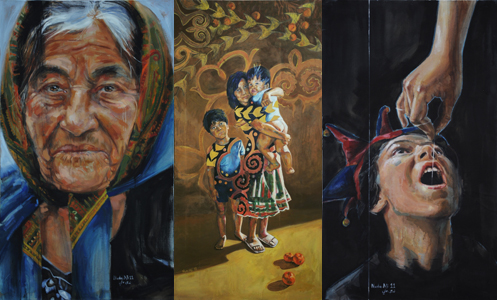Interview: Nada Ali | Damascus, Syria
 Nada Ali graduated from the Department of Fine Art at the University of Damascus, Syria.
Nada Ali graduated from the Department of Fine Art at the University of Damascus, Syria.
Her large scale oil paintings address the human condition through portraiture.
Artist Statement: 'Humans beings have always been interesting to me, from the most simple attitudes to the greatest civilizations that they have built .... and destroyed. The power of art is my main faith and belief; therefore, I seek a good opportunity and a space to enable me mastering this power. I believe in human artistic creativity, which could be more effective against any other weapon, and to reach out humanity's goals. Improving my artistic skills is my ultimate tool to accomplish my mission in spreading the power of art among people, so we’d all realize our dreams of justice, freedom, love and peace.'
Can you tell us about yourself and your background as an artist? 
At the age of 15 I started taking art classes; since childhood drawing was my way to express myself. At the age of 17 I started my 4 year academic studies at the Faculty of Fine Art, Damascus University, department of mural painting. Since then, I unfortunately had to leave Syria due to unstable circumstances. In 2013, I finally landed in Stockholm, Sweden, hoping to have better life and chances to continue my work and studies.
You work primarily with oil-paint on canvas or MDF. Why do you choose to work with these materials?
During my studies at the University, I have attended various workshops on multiple techniques, such as Plastic Art in cement, ceramics and graffiti, and experienced working with different techniques Oil painting, however, has remained my favorite technique since with oil painting color manipulation is very easy and it has great flexibility where a wide range of varied effects can be produced. In the same manner, changing the surface can give the work different depth and texture. Many of the great painters of the past, like Ilya Repin, Ivan Kramskoy and Lawrence Alma-Tadema, have strongly influenced me and inspired me to work with the same materials.
Most of your works are portraits. How do you choose your subjects? Can you tell us about the content and concepts in your work?
In the first place, I have a strong interest in human beings, and nothing can tell us about the human condition as effectively as portraiture. That’s why human beings are my favorite subjects, both in drawing and painting. Portraits are the mirrors of our inner selves. In my portraits I try to reveal what’s hidden behind the face, whether the face is taken from a picture or reality. However, painting has basic standards and conditions to be good regardless of the content.
Can you speak about the use of symbols and cultural references in your work?
Whether they are patterns, colors, object, etc., symbols can be used for different reasons: purely for aesthetic purposes, or also to reveal the subject background and identity, or to send a message through the painting, by using the meaning of the symbol itself. I spontaneously use such symbols in my work. Where I come from, there is no house empty of these symbols; they carry meanings and reflect our society’s traditions and beliefs.
 How has the conflict in Syria effected your work and your subject matter?
How has the conflict in Syria effected your work and your subject matter?
The conflict in my homeland caused a conflict inside me. On the one hand I felt responsible to take action, since I believe that our role as artists is to raise awareness about human rights. In the beginnings of 2012, I’ve worked together with three other artists to present the project Propaganda (a collaborative installation project- to be featured in EAS projects) in Damascus. We chose this theme to show the fact that the media are manipulating minds and distorting the truth, as it is happening in the current conflict in our country. On the other hand, due to the conflict, I had to leave my country right after Propaganda. Although I worked intensely on my first solo exhibition about human beings, war and peace, due to my relocation this exhibition is yet to be realized.
In your artist statement you speak of the power of human creativity. Can you elaborate on the importance of art and artists in today’s society?
A society develops by observing itself, and what allows a society to do so are the producers of art and culture. Through the ages, artists were the ones who fearlessly pointed out social problems and represented the world in whole new ways. They strongly affected the public opinion and often succeeded in making fundamental changes that reached the whole world. Accordingly, the artists who employ their skills and abilities for social causes and for change are in my point of view the eternal ones. Art has always proved that the essential things bring us together as human beings, regardless of the differences that blur our vision of living in peace and harmony.
“The critic has to educate the public; the artist has to educate the critic” - Oscar Wilde
See more of Nada's work HERE.